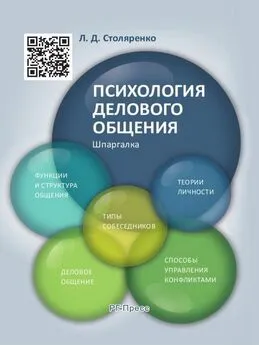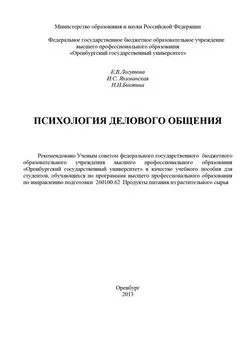Евгений Резников - Психология этнического общения
- Название:Психология этнического общения
- Автор:
- Жанр:
- Издательство:Литагент «Когито-Центр»
- Год:2008
- Город:Москва
- ISBN:978-5-9270-0117-0
- Рейтинг:
- Избранное:Добавить в избранное
-
Отзывы:
-
Ваша оценка:
Евгений Резников - Психология этнического общения краткое содержание
Автор монографии исследует различные стороны этнического общения, его перцептивную, коммуникативную и интерактивную функции, межличностные отношения и регулятивный аспект, при рассмотрении коммуникативной функции анализирует стратегию, тактику и методы психологического воздействия (убеждение, внушение, заражение и подражание). Анализ регулятивного аспекта имеет применение не только в теоретико-методологическом плане, но и в прикладном, так как позволяет прогнозировать поведение представителей этноса.
Книга представляет интерес для научных работников, преподавателей, аспирантов, студентов и специалистов, занимающихся оптимизацией этнического общения.
Психология этнического общения - читать онлайн бесплатно ознакомительный отрывок
Интервал:
Закладка:
Collier M., Ribeau S., Hecht M. Intracultural communication rules and outcomes within three domestic cultures // International journal of intercultural relations. 1986. N 10. P. 439–457.
Cook M. Interpersonal perception. Harmondsworth, England, 1971.
Cook M. Interpersonal and attitudal outcomes in cooperative interracial groups // Journal of research and development in education. 1978. N 12. P. 97–113.
Cushman D., King S. The role of communication rules in explaining intergroup interaction // Intergroup communication / W. B. L. Gudykunst. L., 1986.
Cushman D., Whiting G. An approach to communication theory: Toward a consensus on rules // Journal of communication. 1972. N 22. P. 217–233.
Dawar N., Parker P. M., Price L. J. A cross-cultural study of interpersonal information exchange // Journal of international business studies. 1996. Third quarter.
DeVito J. A. Human communication: the basic course. N. Y., 1994.
Ekman P. Universal and cultural differences in facial expression of emotion // Nebraska Symposium on Motivation / J. R. Cole. Lincoln, University of Nebraska Press, 1972.
Ekman P. Cross-cultural studies of facial expression // Darwin and facial еxpression. A century of research in review / P. N. Y. Ekman. L. 1973. P. 169–222.
Ekman P . Facial expression and emotion // American psychologist. 1993. April. Р. 384–392.
Ekman Р., Friesen W. Unmasking the fact. N. Y., 1975.
Ekman Р., Friesen W. A new pan-cultural facial expression of emotion //Motivation and emotion. 1985. N 10. P. 159–168.
Elbedour S., Shulman S., Kedem P. Adolescent intimacy. Cross-cultural study // Journal of Cross-Cultural Psychology. 1997. V. 28. N 1.
Foa U. , Foa E. Societal structure of the mind. Springfield, Il., 1974.
Friesen W. V. Unmasking the face. N. Y., 1972.
Frijda N. H. Emotions and their recognition // Feelings and Emotions / Arnold M. B. N. Y., L., 1970. P. 241–250.
George J. M., Jones G. R., Gonzalez J. A . The role of affect in cross-cultural negotiations // Journal of international business studies. 1998. V. 29. N 4.
Gergen K., Morse S., Gergen M. Behavior exchange in cross-cultural perspective // Handbook of cross-cultural psychology / R. Triandis, R. Brislin. Boston, 1980. Vol. 5.
Gibbs J. Norms: The problem of definition and classification // American journal of sociology. 1965. N. 70. P. 586–594.
Goffman E. The presentation of Self in everyday life. N. Y., 1959.
Gorer G. Exploring English character. L., 1955.
Gouldner A. The norms of reciprocity: A preliminary statement // American sociological review. 1960. N 25. P. 161–179.
Gudykunst W. D. Intercultural communication theory. Beverly Hill, CA, 1983.
Gudykunst W. D. Uncertainty and anxiety // Theory in intercultural communication / Y. Kim, W. D. Gudykunst. Newbury Park, CA, 1988.
Gudykunst W. D. Bridging differences: Effective intergroup communications. Thousand Oaks, 1994.
Gudykunst W. B., Kim Y. Communicating with strangers. N. Y., 1984.
Gudykunst W. B., Nishida T. Attributional confidence in low– and high-context cultures. Human Communication research. 1986. N 12. P. 525–549.
Gudykunst W. B., Ting-Toomey S., Chua E. Culture and interpersonal communication. Newbury Park, 1988.
Hall E. T . Silent language. NY, 1959.
Hall E. T. Hidden dimensions. N. Y, 1966.
Hall E. Beyond culture. N. Y., 1969.
Hall E. The dance of life. N. Y., 1983.
Hall E. T., Hall M. R. Understanding cultural differences: Germans, French and Americans. Yarmouth, 1990.
Hampden-Turner, C., Trompenaars F. The seven cultures of capitalism: Value systems for creating wealth in The United in States, Britain, Japan, Germany, France, Sweden and The Netherlands. New York: Doubleday, 1993.
Hampden– Turner Ch., Trompenaars F . The seven cultures of capitalism. Value systems for creating wealth in the US, Britain, Japan, Germany, France, Sweden, and the Netherlands. Judy Piatkus. L., 1994.
Handbook of cross-cultural psychology. In 6 v. / H. C. Triandis, W. W. Lambert Boston, London, Sydney, Toronto, 1980. V. 1. P. 1–15.
Handbook of cross-cultural psychology / J. W. Berry, Y. H. Poortinga, J. Pandey, P. R. Dasen, T. S. Saraswathi, M. H. Segall, C. Kagitcibasi. Vol. 1–3. Boston: Allyn amp; Bacon, 1997.
Hasegawa T., Gudykunst W. Silence in Japan and the United States // Journal of Cross-cultural Psychology. 1998. V. 29. № 5. P. 668–684.
Hecht M. L., Ribeau S. Ethnic communication: A comparative analysis of satisfying communication // International journal of intercultural relations. 1984. N 8. P. 135–151.
Hemesath M., Pomponio X . Cooperation and culture: students from China and United States in a prisoner’s dilemma // Cross-cultural research. 1998. V. 32. N 2. P. 171–184.
Hirokawa R., Miyahara A. A comparison of influence strategies utilized by managers in American and Japanese organization // Communication Quarterly. 1986. N 34. P. 250–265.
Hofstede G. Value systems in forty countries // Cross-cultural contributions to psychology / L. Eckensberger, W. Lonner. Poortinga. Lisse, Netherlands, 1979.
Hofstede G. Culture’s Consequences: International differences in work related value. Beverly Hills, 1980.
Hofstede G. Dimensions of national cultures in fifty countries and three regions. // Explications in cross-cultural psychology / J. Deregowski, S. Dzuirawiec, R. Annis Lisse. Netherlands, 1983.
Hofstede G. Cultural constrains in management theories // Academy of managment executive. 1993. V. 7. N 1. P. 81–94.
Huston T. L., Levinger G. Interpersonal ayraction and relationships // Annual revie Psychology. 1978. P. 115–156.
Hymes D. Models of the interaction of language and social life // J. Gumperz, D. Hymes. Directions of sociolingustics. N. Y., 1972.
Izard C. The face of emotion. N. Y., 1971.
Johnson C. Interdependence, reciprocity and indebtedness. An analysis of Japanese American kinship relations // Journal of marriage and the Family. 1977. 39. P. 351–364.
Jolley R. P., Zhi Z., Thomas G. V. The development of understanding moods metaphorically expressed in pictures // Journal of cross-cultural psychology. 1998. N 2. P. 358–376.
Kagan S., Knight G., Martinez-Romero S. Culture and development of conflict resolution style // Journal of Cross-Cultural Psychology. 1982. N 13. P. 43–59.
Kasperson R. E., Golging D., Tuler S . Social distrust as a factor in siting hazardous facilities and communicating risks // Journal of social issues. 1992. N 4. Vol. 48. P. 161–187.
Katz L., Braly K. Racial stereotypes in one hundred college students // Journal of Abnormal and social psychology. 1933. V. 28. P. 280–290.
Kendon A. Studies in the behavior of social interaction. Liss., 1977.
Kimmel P. R. Cultural perspectives on International negotiations // Journal of social issues. V. 50. N 1. 1994. P. 179–196.
Knapp M. Dyadic relationship development // Nonverbal interaction / J. Wiemann, R. Harrison/ CA: Beverly Hills, 1983.
Langlois C., Langlois J.– P . Behavioral issues of rationality in international interaction // Journal of conflict resolution. 1999. V. 43. N 6.
Leonhard K. Der menschliche ausdruck. Leipzic, 1968.
Lesiker R. V. Basic business communication. Boston: Mass., 1991.
Levine R., Norenzayan A. The pace of life in 32 countries // Journal of cross-cultural psychology. 1999. V. 30. N 2. P. 178–205.
Lonner W. The search for psychological universals // Handbook of cross-cultural Psychology. Boston, London, Sydney, Toronto, 1980. V. I. P. 143–204.
Mackay K. J., Fesenmaier D. R. An exploration of cross-cultural destination image assessment // Journal of travel research. 2000. V. 38. May.
Mahler I. , Greenberg L., Hayashi H. A comparative study of rules of justice: Japanese versus Americans // Psychologia. 1981. P. 1–8.
Martin J., Nakayama Th. Intercultural communication in contexts. L. Toronto, 2000.
McLaughlin M. Conversation: How talk is organized. Beverly Hills, 1984.
Miller M., Reynolds R., Cambra R. The selection of persuasive strategies in multicultural groups. Paper presented at speech Communication Association Convention. Louisviller, Ky., 1982. November.
Morse S. Requirements for love and friendship in Australia and Brazil // Australian journal of psychology. 1983. № 35. P. 469–476.
Nierenberg G. J., Calerro H. H. How to read a person like a book. N. Y., 1973.
Nishida H., Hammer M. R., Wiseman R. Cognitive differences between Japanese and americans in their perceptions of difficult social situations // Journal of cross-cultural psychology. 1998. V. 29. N 1.
Noesjirwan J . A rule-based analysis of cultural differences in social behavior: Indonesia and Australia // International Journal of psychology. 1978. N 13. P. 305–316.
Nomura N., Barnlund D. Patterns of interpersonal criticism in Japan and the United States // International Journal of Intercultural Relations. 1983. № 7. P. 1–8.
Okabe R. Cultural assumptions of East and West: Japan and the United States // Intercultural communication theory / W. Gudykunst. Beverly Hills, CA. 1983. P. 1–33.
Oskamp S. Attitude and opinions. Prentice Hall, N. J., 1991.
Pascale R. T., Athos AG. The art of Japanese management. Harmondsworth, 1998.
Peabody D. National characteristics. Cambridge University Press, 1985.
Samovar L. A., Porter R. E . Communication between cultures. N. Y., 1995.
Samovar L, Porter R., Stefani L. Communication between cultures. Belmont, 1995.
Schimmack U. Cultural influences on the recognition of emotion by facial expressions. Individualistic or Caucasian Cultures? // Journal of Cross-Cultural Psychology. 1996. № 1. P. 37–50.
Spitzberg B., Cupach W. Interpersonal communication competence. CA: Beverly Hills, 1984.
Tessler M., O’ Barr W., Spain D. Transition and identity in changing Africa. N. Y., 1973.
Ting-Toomey S. Toward a theory of conflict and culture // Communication, culture, and organizational processes / W. Gudykunst, L. Stewart, S. Ting-Toomey. Beverly Hills, CA, 1985.
Ting-Toomey S. Japanese communication patterns: Insider versus the outsider perspective // Word Communication. 1986a. N 13. P. 113–126.
Ting-Toomey S. Conflict styles in black and white subjective culture // Current research in interethnic communication / Y. Kim. Beverly Hills, 1986b.
Ting-Toomey S. A comparative analysis of the communicative dimensions of love, self-disclosure maintenance, ambivalence, and conflict in three cultures:
France, Japan, and the United States. Paper presented at the International Communication Association convention. Montreal, 1987, May.
Ting-Toomey S. A face-negotiation theory // Theory in intercultural communication / Y. Kim. Gudykunst. Newbury Park, 1988.
Triandis H. Interpersonal relations in international organizations // Organizational behavior and human performance // 1967. N 7. P. 316–328.
Читать дальшеИнтервал:
Закладка:










